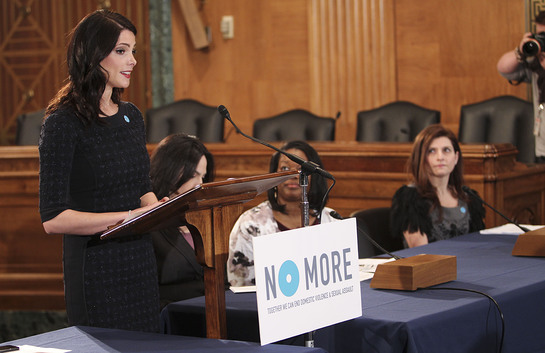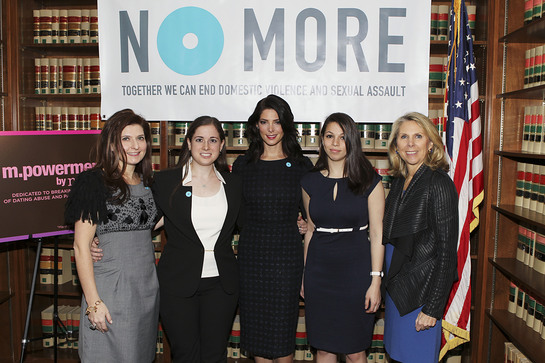mark. Brand Ambassador Ashley Greene recently joined advocates on Capitol Hill in Washington, D.C. for a congressional briefing to announce data from the “NO MORE Study: Teens and Young Adults,” funded by m.powerment by mark., managed by the Avon Foundation for Women.

The results of the study – which explored attitudes toward, and experience with dating abuse, partner violence, and sexual assault among teens and young adults – clearly underscore the need to educate young people so they recognize the signs of abuse and how to safely intervene to help end it.
The study showed that dating violence and sexual assault are a disturbing reality in the lives of young people. One in 6 young women self-reported having been a victim of sexual assault, more than a third reported knowing a victim of sexual assault and over half know a victim of dating abuse. In contrast, only 36% of young men reported knowing a victim of dating violence and 25% reported knowing a sexual assault victim, because they talk much less about the issue. However, the study found that both young women and men are willing to intervene to stop abuse, but they don’t feel confident to recognize abusive situations and are unsure how to intervene.

“As a young woman, I am proud to help launch the NO MORE campaign and announce the new m.powerment by mark. Healthy Relationship College Program,” said Ashley Greene. “While the results of the NO MORE study are sobering, the silver lining is that the respondents reported they were willing to get involved to stop the abuse. We have the power to end the cycle and this is a monumental step towards that.”
mark. Global President Meg Lerner, who introduced Ashley Greene at the congressional briefing, said: “NO MORE is such an impressive coalition of this country’s domestic violence awareness, advocacy and direct service organizations who have united with their government partners and the private sector in a common commitment to say NO MORE. The Avon Foundation for Women and m.powerment by mark. are proud to be a part of this important movement to break the silence and end domestic violence and sexual assault.”
Ashley Greene also announced that m.powerment by mark. will award 25 new grants totaling $125,000 to expand the m.powerment by mark. Healthy Relationship College Program. These m.powerment campus programs will help students recognize the warning signs and encourage them to actively step-in as bystanders to prevent and stop violence before it starts. The new campus grants will reach tens of thousands more students, administrators, faculty, sports teams, fraternities and sororities in 18 states, which will advance m.powerment by mark.’s goal of reducing partner abuse and violence.
NO MORE Study Findings
Some of the most significant findings of the NO MORE study, which surveyed teens (ages 15-17) and young adults (ages 18-22) and was conducted by GfK Public Affairs and Corporate Communications include:
Dating violence and sexual assault are a disturbing reality in the lives of young people between the ages 15 to 22 today:
• 1 in 6 young women self-report having been a victim of sexual assault. More than a third of them know a victim of sexual assault, and over half know a victim of dating abuse.
• Young men are less aware of the issue impacting those they know: 36 percent of young men report knowing a victim of dating abuse and a quarter know a victim of sexual assault.
Young people – men and women alike—are willing to intervene to stop abuse:
• They are equally willing— in large numbers—to step in if they see a stranger being abused — 62 percent of young people would intervene.
• Of those who have known a victim, more than half—54 percent- report they intervened. 60 percent of those who didn’t intervene said they would, if they could go back.
• They also see a role for themselves and their communities in addressing abuse—only 19 percent report they would not intervene because it is a “private” matter.
Young people don’t feel confident to recognize abusive situations, and are unsure how to intervene:
• 53 percent think intervening would be hard
• 40 percent say they would not know what to do
• Many fewer young men than women talk about partner abuse with family or friends, or recognize it in those they know.
• 1 in 3 are afraid they will be physically hurt if they intervene.
It’s important to educate young people to anticipate their actions and the possible consequences of their actions:
• Young women are 3 times as likely as young men to report having hit a significant other.
• 76 percent of those who have hit did not think they would be capable of that behavior. 86 percent of those who haven’t hit think they are incapable of it.
• When asked why they hit a partner, 59 percent report it was because they were hit first.
We must better educate younger girls because their risk for abusive experiences escalates dramatically between the ages of 15 and 22:
• While 40 percent of young women 15 to 17 know someone who’s been a victim of dating abuse, by 18 to 22 almost 60 percent know a victim.
• Unfortunately, while 6 percent of 15-17 year old girls have themselves been a victim of sexual assault, among 18-22 year olds 22 percent have been sexually assaulted.




